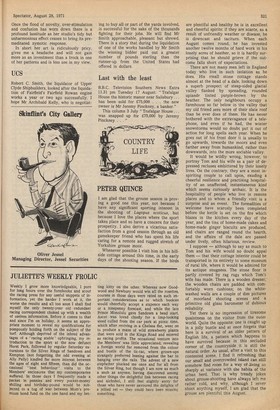JULIETTE'S WEEKLY FROLIC
Weekly I grow more knowledgeable, I pore for long hours over the formbooks and scour the racing press for any useful snippets of information, yet the harder I work at it, the worse the results and all too soon I shall find myself the only twenty-year old redundant racing correspondent choked up with a wealth of useless information. Before it comes to that and since I'm on holiday, it seems an appropriate moment to reveal my qualifications for pompously holding forth on the subject of the turf. Although deprived of the inbred advantages of a ' racing stable' upbringing, my introduction to the sport at the now defunct Hurst Park, followed by regular Saturday excursions to the Silver Rings of Sandown and Kempton (not forgetting the odd evening at Ally Pally) kindled far more interest between the ages of eight and fifteen, than did the occasional 'best behaviour' visits to the Members' enclosures that my contemporaries suffered. In those days I frequently made a packet in pennies and every pocket-money shilling and birthday-pound would be subjected to a tug of war between Mum's premium bond fund on the one hand and my bet ting kitty on the other. Whereas now Goodwood and Newbury would win all the rosettes, courses in those days were rated on such important considerations as to which bookies would cheerfully accept a sixpence each way or a ninepenny forecast, and while the late Prince Monolulu gave Sandown a head start, Ascot was loved chiefly for a limp-looking weed culled from the car park at picnic time, which after reviving in a Chelsea flat, went on to produce a maze of wild strawberry plants that were sold in the Kings Road and entered as racing profits. The occasional venture into the Members' was little appreciated, revealing a foreign world far removed from the colour and bustle of the tic-tac, where grown-ups strangely preferred leaning against the bar to hanging over the rails. The advent of a new stepfather plucked me once and for all from the Silver Ring, but though I am now as much a snob as anyone, having discovered among other things the delightful link between racing and alchohol, I still feel slightly sorry for those who have never savoured the delights of a jellied eel — they could have been missing something.
are plentiful and healthy he is in excellent and cheerful spirits: if they are scarce, as a result of unfriendly weather or disease, he is downcast and taciturn. When each August comes round, he has invested another twelve months of hard work in his lonely acres of heather, so it is hardly surprising that he should grieve if the outcome falls short of expectations.
There are not many men left in England today who live in such isolation as he does. His small stone cottage stands almost at the head of a dale, looking down a superb prospect of steep-sided glacial valley flanked by spreading, rounded uplands tinted purple-brown by the heather. The only neighbours occupy a farmhouse so far below in the valley that my old friend sees more of their slate roof than he ever does of them. He has never bothered with the extravagance of a telephone, and even if he had, the winter snowstorms would no doubt put it out of action for long spells each year. When he goes out of his front door it is usually to go upwards, towards the moors and even farther away from humankind, rather than downwards, into the more sociable valley.
It would be wildly wrong, however, to portray Tom and his wife as a pair of depressed recluses embittered by their lonely lives. On the contrary, they are a most inspiriting couple to call upon, exuding a cheerful resilience and practising hospitality of an unaffected, instantaneous kind which seems curiously archaic. It is the hospitality of people who live in remote places and to whom a friendly visit is a surprise and an event. The formalities of welcome have scarcely been completed before the kettle is set on the fire which blazes in the kitchen every day of the year, and the tins of home-made cakes and home-made ginger biscuits are produced, and chairs are ranged round the hearth, and the affairs of the dale are passed under lively, often hilarious, review.
I suppose — although to say as much to Tom and his wife would no doubt appal them — that their cottage interior could be transported in its entirety to some museum of rural life, where it would be admired for its antique snugness. The stone floor is partly covered by rag rugs which Tom's wife has made. There is a wooden dresser; the wooden chairs are padded with comfortably worn cushions; on the whitewashed walls are a couple of dim pictures of moorland shooting scenes and a primitive old glass barometer of dubious reliability.
Yet there is no impression of tiresome quaintness on the visitor from the outer world. Quite the opposite: one is caught up in a jolly bustle and at once forgets that here is a survival of an older pattern of English life, a pattern which happens to have survived because in this secluded corner of the countryside it is still the natural order. As usual, after a visit to this contented scene, I find it refreshing that our small and overcrowded island can still somehow find room for a way of living so sharply at variance with the habits of the urban herd. That is why trendy jokes about grouse-shooting have always left me rather cold, and why, although I never shoot anything myself, I am glad that the grouse are plentiful this August.


































 Previous page
Previous page